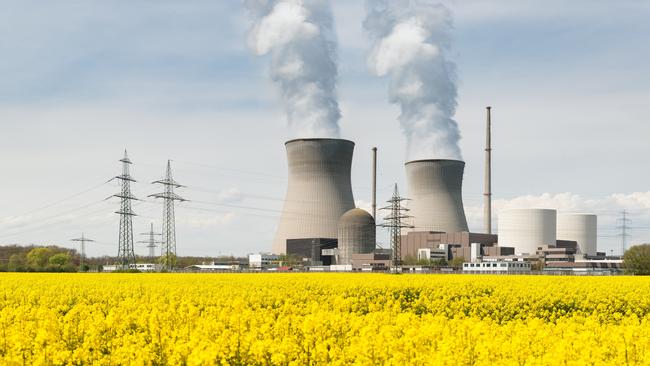
The meaningless numbers appear in A New Choice: Australia’s Climate for Growth, which urges the government to “get on with stopping climate change”.
“There is great opportunity for Australia to act on climate change today,” it enthuses, suggesting we incur $67bn in costs now to slash emissions and secure a gross domestic product and jobs boost of $680bn and 250,000, respectively.
The report is flawed, misleading, reading more like a manifesto than a sober economic analysis.
At a basic level, Australia can’t affect the trajectory of climate change whatever it does, having only 1.3 per cent of global emissions, or about 4 per cent including our coal exports.
Foreign policy is the only way we can meaningfully affect climate change.
Second, Deloitte’s “do nothing” path of supposed disaster assumes nations “do not meet their Nationally Determined Contributions” (emission reduction targets) agreed at the Paris climate conference in 2015. Therefore, it’s not really a base case to the extent government promises mean anything.
If they don’t, why the clamour for governments to say they will be “net zero by 2050”?
Third, the “do nothing” path assumes an obsolete, extreme trajectory for emissions, known as RCP8.5, that pushes up average global temperatures by 4C by 2100.
Professor Detlef van Vuuren, an academic involved in designing RCP8.5, has said it was “never meant to be a business-as-usual scenario”. Developed in 2014, RCP8.5 doesn’t even include more recent emissions data.
“The consequences of an RCP8.5 pathway demonstrate the orders of magnitude of impact well for analytical purposes,” the Deloitte reports says. Political purposes, more like it.
The bigger problem with these integrated climate and economic models is the false sense of precision and knowledge they create.
“They have crucial flaws that make them close to useless as tools for policy analysis,” top MIT economist Robert Pindyck recently wrote.
The pandemic, which has produced a library of wildly wrong expert predictions, should be a reminder of the weakness of mathematical models, especially when related to events decades into the future. Climate modelling is even harder because of a fraught two-part chain of estimation.
Determining “climate sensitivity” — the speed and size of the response of global temperatures to a doubling of carbon dioxide in the atmosphere — is hard enough.
“Over the past decade our uncertainty over climate sensitivity has actually increased,” notes Pindyck. And the “damage function”, how temperature changes affect the economy, is “made up out of thin air … (not) based on any economic (or other) theory or any data”.
Humans will adapt to changed climate, develop new technology, for instance; there will be positives and negatives for different countries from climate change.
“Increasing temperatures can increase both heat and cold-related health problems,” the Deloitte report states, illogically, given cold-related problems would obviously decline. There’s also the question of the additional 250,000 “jobs for the future” that will emerge by 2070 — “by being a country that reaches net-zero emissions, sooner rather than later”.
A world powered by renewable energy might be a scientific and ecological triumph, but also an economic disaster for Australia, which — absent some dramatic innovation — depends on fossil fuel exports to pay its way.
Australia’s coal and gas exports generated more than $100bn last financial year. Like it or not, we have a comparative advantage in fossil fuels in a way we do not in the production of solar and wind energy, or hydrogen.
Economist Warwick McKibbin says if the world moved away from fossil fuels as per the 2015 Paris Agreement our currency would depreciate 6 per cent, and wages fall 2 per cent, by 2030.
“Australia being part of — if not leading the way — in the global shift to net zero in a new growth recovery is in the national interest,” the Deloitte report asserts nonsensically.
Pindyck is well known to economics students for his concept of “the option value of waiting”. It’s far better to wait and see how events turn out tomorrow rather than lock yourself into a particular strategy today you might regret.
Leading the way would be a disaster for a fossil fuel exporter responsible for a sliver of global emissions.
The Deloitte report says solar and wind energy makes “complete or near decarbonisation of the grid a possibility”. But it doesn’t, curiously, mention nuclear power.
We’ve heard so much about the need to follow “the science” this year. The science says it’s the only emissions-free and reliable energy source, and batteries aren’t remotely up to the task of compensating for the intermittency of solar and wind.
Replacing ageing coal-fired power stations with the next generation of nuclear facilities would be a better option than an expensive and implausible “green new deal” that only makes sense if the rest of the world does it too.



Just when you thought you’d had enough scary and ridiculous predictions for one year, along comes Deloitte Access Economics with claims Australia will lose $3.4 trillion in income and 880,000 jobs by 2070 unless it takes drastic action to reduce carbon dioxide emissions.